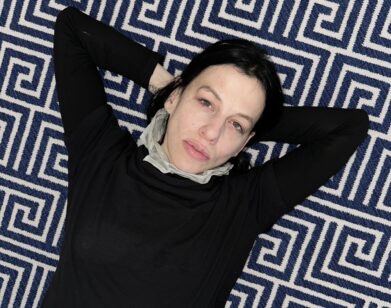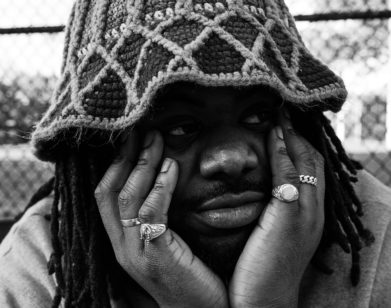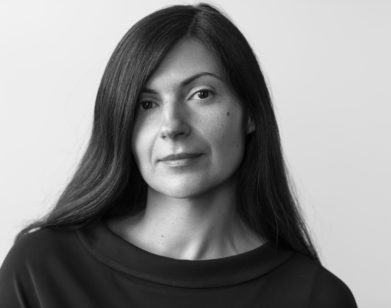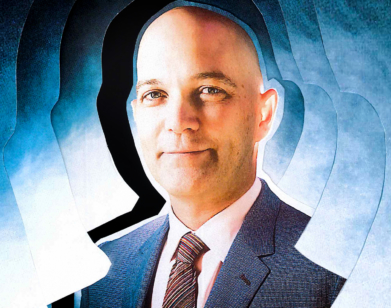Hamlet Director Yaël Farber Asks Us to See Shakespeare in Ourselves
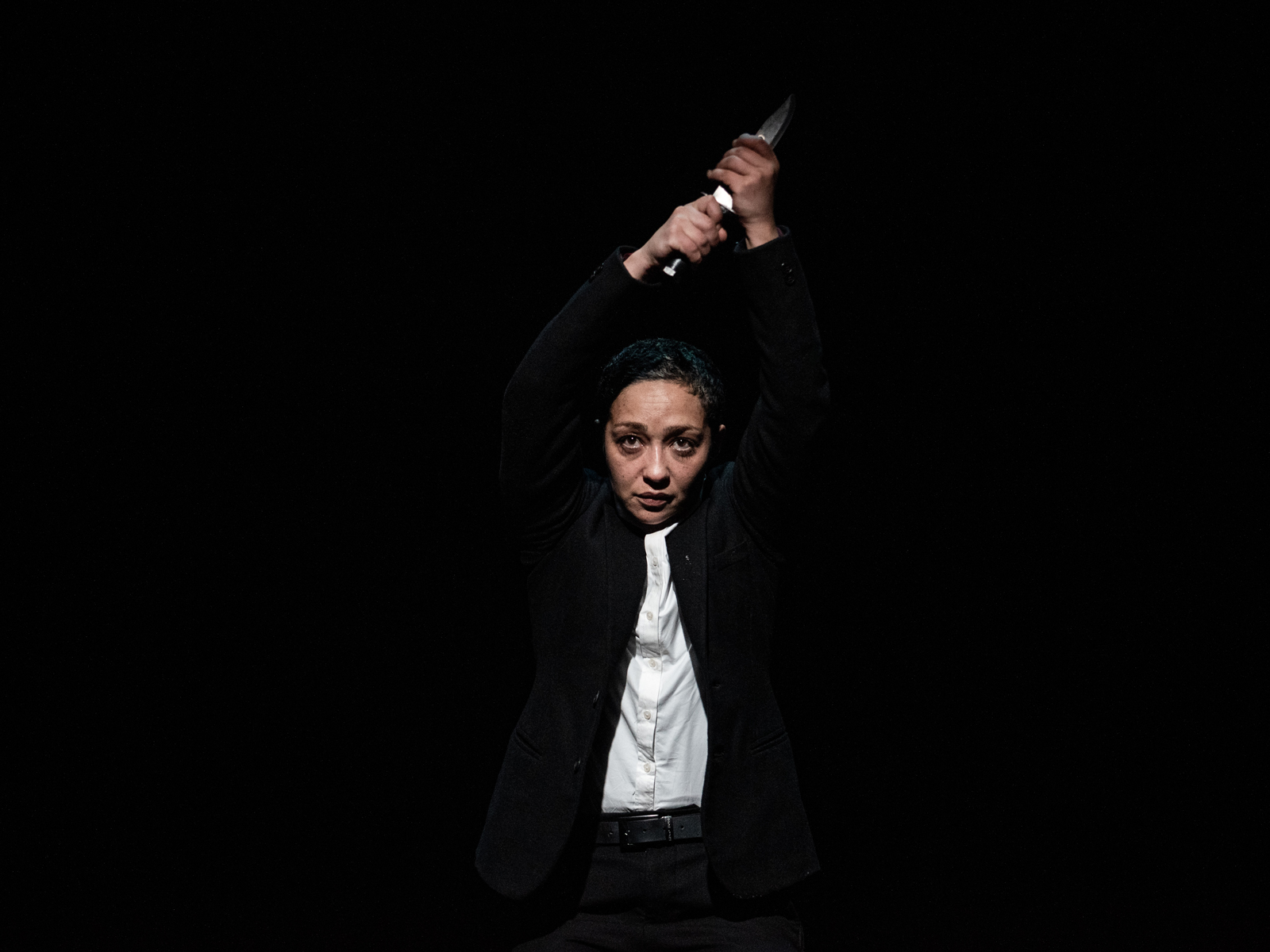
Ruth Negga as Hamlet. Photo by Teddy Wolff.
From its opening lines to its lingering soliloquies, Hamlet has always been a play of questions. And Yaël Farber, the director of a current production at Brooklyn’s St. Ann’s Warehouse, isn’t offering any easy answers. Farber’s Hamlet, which first stunned audiences into held-breath silence at the Gate Theater in Dublin, is not your typical Hamlet. And not simply because the titular privileged, pouting prince is played by the incomparable Ruth Negga.
With an increased focus on the sobering realities of death—unlike the text, the play begins with the sight of Hamlet’s father laid out on a real autopsy table—this is a Hamlet designed not to highlight the antics of a conflicted young man, but to jar audiences into a fundamental understanding of that conflict itself. “To me,” Farber says, “Hamlet is the only one reacting appropriately to the situation.” The “situation” is both the death of Hamlet’s father and Hamlet’s burgeoning understanding that the structures he once held sacred and assumed sacrosanct are, in fact, not. In Farber’s hands, the central tension of Hamlet’s most quoted question—”To be or…”—is about more than Hamlet’s suicidal ideations; it is about the potential in Hamlet to “not be,” yes, but also about the terror of recognizing that same potential in his father, his family, his world as he knows it. In this way, it asks us to recognize that potential in ourselves.
If this sounds unsettling, well, that’s the point. In Hamlet, instability begets questions, which, if we’re lucky, beget answers—and, if we’re luckier still, those answers become actions. For Farber, it’s that call to potential action that so animates this story in our present day. If putting Negga in Hamlet’s shoes suggests the prince’s identity is in no way fixed, then it is perhaps not so hard to imagine, in our days of climate change and democratic crisis, that we might be Hamlets, too. “Hamlet’s feelings could feel very much like most of ours at the moment,” she says. “What on earth is going on? And what do I choose to do about it?”
Here, Farber answers a few of my questions, if not the one posed above, and tells us what wisdom we can hope to take away from the bereaved, brave prince of Elsinore.
———
JADIE STILLWELL: I know Hamlet is a play so much about death, but I want to start with the origin story of this production. Can you tell me a little bit about how Hamlet was born?
YAËL FARBER: Selina Cartmell, the artistic director of the Gate Theater in Dublin in Ireland, reached out to me. She knew my work and wanted to know what production I would like to direct for the Gate. We went through a couple of titles, and I was not particularly drawn to the idea of doing Hamlet. I’m always asking, does the world need that story right now? I grew up in a very political society in South Africa, so it’s never about doing theater just because I feel like telling a story, but because I feel like it would be an urgent and powerful story to tell the world, at this moment. Then Selina suggested looking at a woman to play Hamlet. The moment she said Ruth Negga, it was like, yes. I felt that if I’m going to hear from a Hamlet who tells us “time is out of joint / O cursed spite, that ever I was born to set it right,” then I wanted to hear it from somebody that I felt could speak with a certain authority and from a place of truth about what it meant to be someone in a society. Ruth and I had a series of Skype conversations, and it felt like we were very much aligned in why we felt a sense of purpose about this play. It’s a political sense of purpose. It’s a sense of telling a Hamlet that is not about a privileged prince who can’t make up his mind, or who is pouting. Rather, I felt Hamlet’s behaviors did not have to be mysterious to us. His feelings could feel very much like most of ours at the moment, which are: What on earth is going on? And what do I choose to do about it?
STILLWELL: Do you feel that having a woman as Hamlet changes the meaning of the play?
FARBER: The color of the skin one grows up in and the gender that you’re born into—or how that gender is defined by society—these things inform our experiences. But what I was interested in is the fact that gender is, to such a large degree, performative. And with a very fine artist, one could actually release the story in such a way that gender almost becomes incidental. In other words, I knew from the beginning. I said to Ruth, we’re not doing a Hameletta. We’re not doing a woman who is in a gay relationship with Ophelia. We’re going to stick with the pronouns as they are, and we are going to manifest a person whose gender identity is defined by the pronouns he and him. At the very first photo shoot that we did with Ruth for the poster, I immediately saw how she climbed into the suit and transformed. That’s the most exciting political gesture to me, the idea that these roles can be played without some kind of straining towards being beyond oneself or attempting to be something you’re not.
STILLWELL: Is Shakespeare a vehicle that allows for these kinds of transformations—for a woman to play a man, or other changes of that nature—in a way that other texts or plays don’t? Maybe in part because there’s such canonicity to the work.
FARBER: Yes. I think the one other place that I tend to find this capacity, although I’m sure there are others, is in the Greek tragedies. It’s because, yes, there’s something canonical about it. And there’s something about how distantly it places us in a time that is beyond the immediateness of details. Shakespeare and the Greek tragedies allow for a certain amount of perspective because even to try and place it within Shakespeare’s time is not necessarily accurate. He was often writing outside of his time. He’s writing in ancient Rome, he’s writing in Venice, or in this case, he’s writing in Denmark. There is no such thing as a contextual detailed naturalist accuracy. If you’re simply placing the play in Elizabethan English costume, that itself is an artifice. So as you open up that lens, as that aperture widens, there’s more bandwidth for a director and for actors to play inside what’s possible and to bring out the metaphysics of the concepts and the scenes. I think gender does open up in a more exciting way, or simply a more fluid way, inside texts that are able to accommodate it.
STILLWELL: I love that you say that, because I think people often suppose that the canonical texts are more rigid, maybe, than others. But I think the opposite might be true, and that there’s really tremendous room for interpretation.
FARBER: I think we become quite precious about what we think honors the past. But if you look at what Shakespeare was doing, there was nothing specifically Elizabethan about it. I feel like attempting to recreate that then, in a strange way, almost betrays the roots of the work. It’s like if in 400 years someone was emulating [Quentin] Tarantino and sticking with a strange devotional detail to the specificities, rather than the nerve that he was trying to touch. When you crystallize something, and you trap it in glass, you say that crystallization is its truth.
STILLWELL: You fix it.
FARBER: Yes, you fix it. And I feel that you actually betray the intention of the artist and its origin.
STILLWELL: Tarantino hits a particular nerve, but what nerve do you feel like Hamlet is hitting?
FARBER: I feel well met by Hamlet. I’m still not particularly interested in the indecisive existential crisis of a privileged gentleman who is struggling with what we all struggle with, which is death. To me, there are much wider implications. It works at a spiritual level. It works at a psychoanalytical level. It works at a political level. I feel like the times we’re in at the moment have thrown us all onto the playing mat. We feel a sense of bewilderment. We feel that things that we took to be solid structures—that were seemed almost to be designated by the gods—are actually very flimsy agreements. Like what constitutes democracy? What constitutes the ethics of a country like England or America? What are these institutions that we thought were unshakeable, that we are actually watching crumble? And at a much larger level, we still continue on as though everything is going to go on forever. We’re being asked to face our very sobering reality as the temperature rises each year. There’s an incredible existentialism at the core of it all. So I feel like we’re actually in a profoundly Hamlet moment.
To me, Hamlet’s the only person who’s responding appropriately to the situation. He is the interface of all the deeply anxiety-inducing, deeply humbling, and, in a way, spiritually awakening reckonings with our own impermanence. Our existentialism. Our likely extinction. The inclination we have towards smiling and nodding at a Claudius, saying yes, yes, and just hoping we end up on the top of the stack. Hamlet, to me, is the awakening of somebody’s deep politics. That he goes from bewilderment to standing over Claudius with a knife and saying, “Now might I do it?” He moves towards the action. Hamlet enters his last fatal fencing match with the kind of knowledge that I feel like Martin Luther King might have had just before he stepped up to make that last speech. Where, even if you don’t know it consciously, you know that you cannot have stuck your neck out this far. You can’t expect to make any real change without the high likelihood that you will pay the ultimate price.
STILLWELL: Your production starts with the death of Hamlet’s father and Hamlet’s response to that death, which is something the text actually doesn’t include. Was that choice a way for you to display that ultimate price, that sobering reality of death?
FARBER: The table that Hamlet’s father [played by Steve Hartland] lies on, is an actual autopsy table that we got in Ireland. It had been used for years and years. While we were working in the studio, I would have to show an actor something, and so I would get up onto it, and several of the actors got up onto it. Ophelia lies on it, Polonius lies on it. There’s something about it that is not just chilling but really remarkable. I think people come to Hamlet and to Shakespeare from a very cerebral place, and I like to work with very strong images and elements of the ritualistic to try and get people beyond their heads. We know we will all end up there on our backs. For me as a young person in South Africa, I just needed time in the darkness of the auditorium to have an encounter with myself, not with the cleverness of something. Really, all I always want from theater is a reckoning with myself. I’m always just trying to curate a public space in which for some, that might be possible.
STILLWELL: How much of Hamlet do you feel is about grief?
FARBER: I know from my own process with grief, when I’ve lost people very, very close to me, that there’s a way that that light refracts into a series of deep insights. We become stripped through grief. We become skinless in a way that actually brings to the fore various aspects of ourselves that may have been on a slow burn for a while. I do know that it’s a very painful period of time when you’re grieving, but it is also a very sacred time where you can see things very clearly, because all illusion is stripped away. So I think its starting point is a portrait in grief. All Hamlet knows when he comes home is that he has lost his father. His very first words to his mother are yes, it is common that I have grief and the grief I have is not something that can be performed, it is. We then springboard out of that incredibly feral state of grieving. Suddenly the scales are falling from one’s eyes, and you’re open to your best friend coming and saying, “I think I saw the ghost of your father yesterday.” You’re in such a state of longing to see or be with this person again. You’re braver, you’re more reckless. You’re up for anything.
STILLWELL: And your sense of reality is completely different, right? Your sense of the world is altered by that kind of loss.
FARBER: There’s an incredible shock that just awakens you. I think what’s so brilliant about this work is that the political, the spiritual, and the existential are all coming out of the gate of grief. Shakespeare lines up the events politically in Elsinore in such a way that Hamlet, who may not have come home with any interest in unseating injustice, is now committed to his father’s revenge through loyalty. But most of all, it’s through grief. I think it is a play about grief, but about grief that gives us access brilliantly into the refraction of that light into many other colors that are set free by that first primal emotion.
STILLWELL: What kind of encounter would you ideally like your audience to have with themselves when they’re watching this production?
FARBER: Whenever I’m directing, I start by asking, what do the audience’s faces look like in the blackout just after the play has ended? Because in that private moment, people have truly experienced something. We may not all agree on what that experience means politically, but we have all or will all lose our fathers. I think if the encounter begins there, with that loss, through the truthfulness that Ruth and the company bring, we remember or imagine what it’s like to be standing over the body of somebody we love. It’s that kind of stripped away feeling of encountering that grief and then realizing the loss of the father at a very potent level. This is very ambitious for a production, but if somewhere on that spectrum people have a personal recalling of an experience of loss that expands into an understanding of the precipice we’re all standing on, and what we stand to lose in these crucial days, that to me would be the ideal unleashing of the unconscious of the audience, which I think is what theater is. It’s a dream. We all agree to come and gather around the pond and look at our reflections and allow something to be released. Then we go home and feel shifted in some way.
STILLWELL: Do you think that we’ll always be performing productions of Shakespeare? I know you weren’t inclined to necessarily do this one, but after your experience with it, do you think that we’ll ever stop responding to Shakespeare as audiences or creators?
FARBER: I don’t think so. I think, in some ways, if Shakespeare was widely understood to be as radical as I think he is, he could be silenced. But thankfully, people sentimentalize him and that will keep him safe. I did Julius Caesar years ago—a production called SeZar in South Africa—quite soon after we got our democracy. It was all actors who had grown up understanding what it was like to grow up disenfranchised in South Africa. And I remember the absolutely electrifying atmosphere at the Market Theater when we did that production. I remember people understanding how fragile democracy is. As you go into Shakespeare’s plays, if you can break away the crust of it as a very academic, cerebral exercise, it’s just astonishing. I felt like I was having a conversation with someone from 400 years ago.
STILLWELL: It’s incredibly human, at a basic level.
FARBER: Absolutely human. Full of our fears and our hopes and our desires. It’s very humbling. It’s very comforting to know not only that Shakespeare had an extraordinary ability to write the words he did, but that he felt the way we feel.

